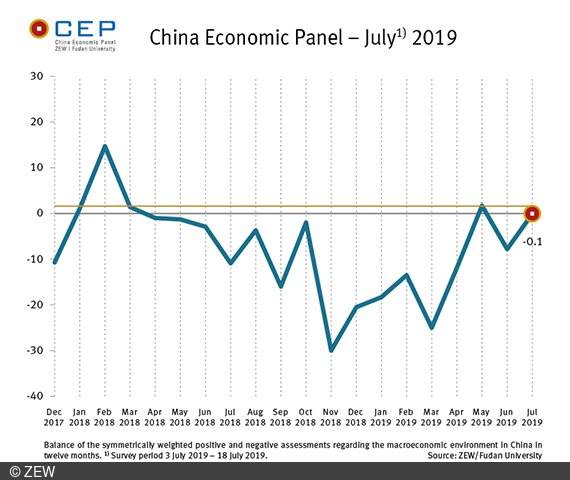Expectations for Chinese Economy Improve Slightly, Economic Outlook Remains Subdued
China Economic PanelCEP Indicator Rises to a New Reading of Minus 0.1 Points
In the most recent survey for July (3–18 July 2019), the expectations regarding the Chinese economy have increased by 7.7 points. With a current reading of minus 0.1 points (June 2019: minus 7.8 points), the CEP Indicator, which reflects the expectations of international financial market experts regarding China’s macroeconomic development over the coming twelve months, remains, however, in negative territory. The CEP indicator has been below its long-term average of 1.6 points since March 2018 and has been experiencing an almost uninterrupted series of negative readings since April 2018.
Given the recently published growth rate of 6.2 per cent for the second quarter of 2019, which is – at least in Chinese terms – relatively low, the experts expect China’s economic growth to slow down even further compared to the status quo. In accordance with these unexpectedly weak growth rates, the assessment of the current economic situation has dropped by 5.4 points, and now stands at minus 15.0 points.
Some of the point forecasts for real gross domestic product (GDP) growth have seen significant downward adjustments. For the third and fourth quarter of 2019, the survey participants expect annual growth rates of 6.0 per cent, respectively. In the previous month, the predicted growth rates were 6.3 per cent (Q3) and 6.2 per cent (Q4).
For the whole of 2019, the experts forecast a growth rate of 6.1 per cent (last month’s forecast: 6.2 per cent) The forecasts for GDP growth are therefore moving towards the lower end of the politically desired target range of 6.0 to 6.5 per cent. The GDP forecasts for 2020 fell by 0.1 percentage points compared to the previous month, and now stand at a current reading of 5.9 per cent.
Trade war puts China's domestic economy under pressure
What is particularly worrying about the results of this current survey is that the negative sentiment seems to have an impact on the economic drivers – private consumption and private investment – which have been relatively stable in the past. The expectations for these two drivers are experiencing a significant decline,” says Dr. Michael Schröder, senior researcher in the Research Department “International Finance and Financial Management” at the ZEW – Leibniz Centre for European Economic Research and project leader of the CEP survey.
What is more, the indicators for the retail trade and services sector have recorded a significant decrease of more than 20 points, respectively. Both indicators are now clearly in negative territory (retail trade: minus 18.2 per cent; services: minus 13.7 per cent. “The negative effects on Chinese exports stemming from the trade war between the USA and China now also seem to have an impact on the domestic economy,” concludes Schröder.
